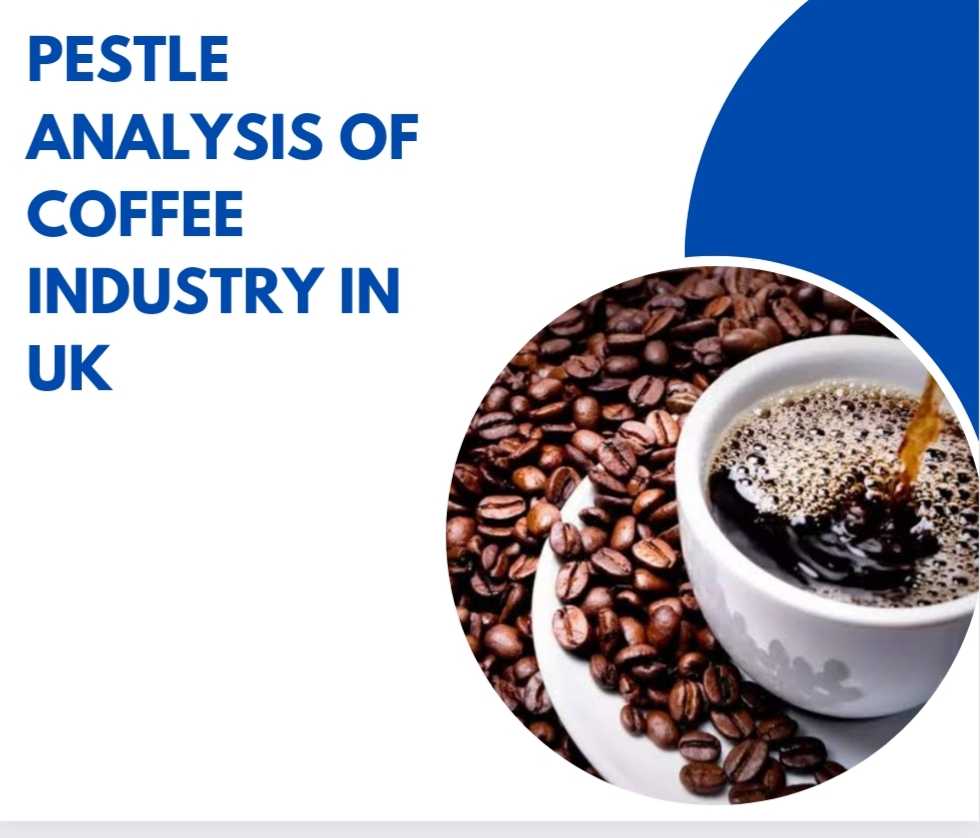The coffee industry in the United Kingdom stands as a vibrant and dynamic sector, deeply embedded in the cultural fabric of the nation. With a rich history of coffee consumption dating back centuries, the UK market has evolved significantly, driven by changing consumer preferences, economic factors, and governmental policies. Understanding the external factors shaping the industry is paramount for businesses seeking to thrive in this competitive landscape.
A PESTLE analysis offers a comprehensive framework for examining the macro-environmental factors impacting the coffee industry. This strategic tool assesses the Political, Economic, Sociocultural, Technological, Legal, and Environmental factors influencing business operations. By conducting a thorough PESTLE analysis, stakeholders can gain valuable insights into the opportunities and challenges present within the UK coffee market.
Table of Contents
TogglePolitical Factors of Coffee Industry in UK
The coffee industry in the United Kingdom is not only a thriving market but also one deeply influenced by political factors. From government regulations to trade policies, political decisions have a substantial impact on the production, distribution, and consumption of coffee within the UK. Understanding these factors is crucial for stakeholders in the industry, including producers, retailers, and consumers.
Government Regulations: Government regulations play a significant role in shaping the landscape of the coffee industry in the UK. This includes regulations related to agricultural practices, import/export policies, and food safety standards. For instance, regulations governing the use of pesticides and fertilizers directly affect coffee farming practices both domestically and in coffee-producing countries. Moreover, import tariffs and trade agreements influence the cost and availability of coffee beans in the UK market.
Environmental Policies: In recent years, environmental concerns have become increasingly important in political agendas worldwide, including the UK. Policies aimed at combating climate change, reducing carbon emissions, and promoting sustainable practices impact the coffee industry. Climate change poses significant challenges to coffee cultivation, affecting crop yields and quality. As a result, government initiatives to address environmental issues have implications for coffee growers and businesses throughout the supply chain.
International Trade Agreements: The UK’s trade agreements with other nations shape the import and export dynamics of the coffee industry. Brexit, in particular, has had a profound impact on trade relationships and regulations. Changes in trade agreements between the UK and coffee-producing countries may affect the availability of coffee varieties, pricing, and market competition. Moreover, trade agreements often include provisions related to intellectual property rights and geographical indications, which can impact branding and marketing strategies within the coffee industry.
Labor Regulations: Labor laws and regulations set by the government influence working conditions and labor practices within the coffee industry. This includes regulations related to minimum wage, working hours, and occupational health and safety standards. Additionally, issues such as fair trade and ethical sourcing have gained prominence, prompting governments to enact legislation to ensure ethical labor practices in coffee production both domestically and internationally.
Political Stability and Instability: The overall political stability of a country or region can impact the coffee industry by affecting production, transportation, and trade. Political unrest, conflicts, or changes in government leadership in coffee-producing countries may disrupt supply chains and lead to fluctuations in coffee prices. Conversely, political stability fosters an environment conducive to investment and growth in the coffee industry.
Economic Factors of Coffee Industry in UK
Coffee, once merely a morning ritual or a midday pick-me-up, has transcended its humble origins to become a global cultural phenomenon and a powerhouse within the beverage industry. In the United Kingdom, the love affair with coffee is palpable, with cafes lining the streets of every city, from the bustling alleys of London to the quaint corners of Edinburgh. However, behind the aroma and the frothy lattes lies a complex web of economic factors that shape the dynamics of the coffee industry in the UK.
1. Consumer Demand and Behavior
At the heart of the coffee industry lies consumer demand, a force that drives the entire market. In the UK, the demand for coffee has surged in recent years, fueled by a growing coffee culture and a preference for premium and specialty brews. Consumers are increasingly seeking unique and artisanal coffee experiences, leading to a rise in specialty coffee shops and boutique roasters.
2. Global Supply Chains
The journey of coffee from bean to cup is a global one, with intricate supply chains connecting coffee-growing regions to consumer markets. The UK relies heavily on coffee imports, sourcing beans from countries such as Brazil, Colombia, and Ethiopia. Economic factors such as currency fluctuations, trade agreements, and geopolitical tensions can significantly impact the supply chain, affecting prices and availability in the UK market.
3. Price Volatility
Coffee prices are notoriously volatile, influenced by factors such as weather conditions, crop diseases, and fluctuations in supply and demand. For coffee producers in developing countries, price volatility can pose significant challenges, affecting their livelihoods and economic stability. In the UK, price fluctuations can impact both consumers and businesses, influencing retail prices and profit margins.
4. Sustainability and Ethical Sourcing
The coffee industry faces mounting pressure to address sustainability and ethical concerns throughout the supply chain. Issues such as deforestation, labor rights, and fair trade practices have become focal points for consumers, regulators, and industry stakeholders. In the UK, there is a growing demand for ethically sourced and sustainably produced coffee, driving initiatives for certification schemes and transparency in sourcing practices.
5. Market Competition
Competition within the coffee industry is fierce, with a multitude of players vying for market share. From multinational coffee chains to independent cafes and artisanal roasters, the landscape is diverse and dynamic. Economic factors such as economies of scale, branding, and marketing strategies play a crucial role in determining the success of coffee businesses in the UK market.
6. Regulatory Environment
The coffee industry operates within a complex regulatory environment, subject to various laws and regulations governing food safety, labeling, and advertising standards. In addition, initiatives aimed at promoting health and sustainability, such as sugar taxes and single-use plastic bans, can impact the sale and consumption of coffee products in the UK.
Social Factors of Coffee Industry in UK
1. Changing Lifestyles:
The fast-paced nature of modern life has led to a surge in demand for convenient and accessible food and beverage options. Coffee, with its quick preparation and energizing properties, has become the go-to choice for many Britons looking for a caffeine boost on the move. This shift in lifestyle preferences has propelled the growth of coffee shops and drive-throughs across the country.
2. Rise of Coffee Culture:
The emergence of coffee as more than just a beverage but a cultural phenomenon has significantly influenced the industry. Coffee shops are no longer just places to grab a drink; they serve as social hubs where people gather to work, socialize, or simply relax. This evolving coffee culture has created opportunities for specialty coffee brands and independent cafes to thrive, catering to discerning consumers seeking unique experiences and artisanal brews.
3. Health Consciousness:
In an era marked by heightened health awareness, consumers are increasingly mindful of what they consume, including their coffee choices. This trend has led to a growing demand for organic, fair-trade, and sustainably sourced coffee options. Ethical considerations, such as environmental sustainability and fair treatment of coffee farmers, have become important factors influencing purchasing decisions, prompting industry players to adopt more responsible practices.
4. Technological Advancements:
The integration of technology into the coffee industry has revolutionized the way coffee is brewed, marketed, and consumed. From smartphone apps that allow users to order ahead to cutting-edge espresso machines capable of producing customized beverages, technology has enhanced convenience and efficiency throughout the coffee supply chain. Moreover, social media platforms have become powerful tools for coffee brands to engage with consumers, showcase their products, and drive brand loyalty.
5. Diversity and Inclusion:
The UK’s multicultural society has contributed to a diverse coffee landscape, with a wide array of international coffee varieties and brewing methods now available. This diversity reflects the country’s openness to different cultures and tastes, enriching the coffee experience for consumers and fostering a sense of inclusivity within the industry. Furthermore, initiatives promoting diversity and inclusion in the workforce have gained traction, leading to greater representation of marginalized groups within the coffee sector.
Technology Factors of Coffee Industry in UK
The aroma of freshly brewed coffee permeates the air of countless cafes and households across the United Kingdom, reflecting the nation’s love affair with this beloved beverage. Behind the scenes, technology plays a pivotal role in every step of the coffee industry, from bean to cup. In this article, we delve into the technological factors driving innovation and shaping the landscape of the coffee industry in the UK.
- Coffee Roasting Technology: Roasting is a critical stage in coffee production, where raw green beans are transformed into the aromatic and flavorful beans we brew. Advanced roasting technology has revolutionized this process, offering precise control over temperature, airflow, and roasting profiles. In the UK, roasteries leverage state-of-the-art roasting machines equipped with computerized controls and data analytics to achieve consistency and quality in every batch. Furthermore, eco-friendly roasting technologies aim to minimize energy consumption and reduce carbon emissions, aligning with the growing sustainability concerns of consumers.
- Automated Brewing Systems: As the demand for premium coffee experiences surges, cafes and coffee shops are turning to automated brewing systems to enhance efficiency and consistency. These systems, ranging from espresso machines to pour-over robots, are equipped with cutting-edge features such as programmable brewing parameters, automated milk frothing, and real-time monitoring of extraction metrics. In the UK, establishments embrace these technologies to streamline operations, deliver a superior customer experience, and empower baristas to focus on craft and customer interaction.
- Digitalization of Supply Chain Management: From sourcing green beans to delivering roasted coffee to consumers, the coffee supply chain is intricate and multifaceted. Digital technologies are reshaping supply chain management, offering transparency, traceability, and efficiency throughout the process. Blockchain-based platforms enable stakeholders to track the journey of coffee beans from origin to cup, ensuring authenticity and ethical sourcing practices. Additionally, advanced inventory management systems optimize logistics, minimize waste, and facilitate just-in-time production, aligning with the industry’s sustainability goals.
- Consumer Engagement through Mobile Apps: In an era characterized by digital connectivity, coffee companies in the UK leverage mobile applications to engage and connect with consumers on a deeper level. These apps offer personalized recommendations, loyalty rewards, and convenient ordering options, enhancing the overall coffee experience. Moreover, integrated payment systems and digital wallets simplify transactions, fostering seamless interactions between coffee enthusiasts and their favorite brands. By harnessing the power of mobile technology, coffee companies can cultivate brand loyalty and drive sales in an increasingly competitive market.
- Sustainable Packaging Solutions: The environmental impact of coffee packaging has emerged as a significant concern for consumers and industry stakeholders alike. To address this challenge, innovative packaging technologies are emerging, offering sustainable alternatives to traditional materials. Biodegradable coffee bags, compostable capsules, and reusable containers are becoming increasingly prevalent in the UK market, driven by consumer demand for eco-friendly solutions. Furthermore, advancements in packaging design and materials enable companies to extend the shelf life of coffee products while minimizing waste, contributing to a more sustainable future for the industry.







